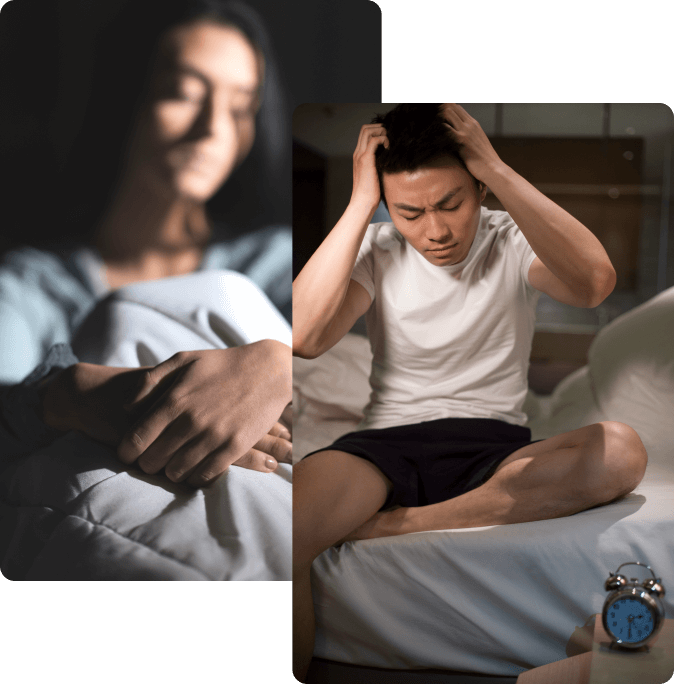If you have difficulty getting to sleep or staying asleep three nights a week for three months or more, you might be affected by insomnia. This disorder is characterized by persistent difficulty with initiating sleep, maintaining sleep, or decreased sleep quality despite adequate time and opportunity for sleep, resulting in some form of daytime impairment. Research reveals that every year, 25% of Americans experience intense insomnia, and this article reviews its most common symptoms and causes. Let’s get into this!
Book an appointment with us for the best treatment for severe insomnia!
Is Insomnia a Mental Illness?
Insomnia is classified as an individual sleep disorder in the Diagnostic and Statistical Manual of Mental Disorders (DSM). It can, however, be a symptom of any other mental or physical disease, or it can be the result of substance abuse. Short-term insomnia is very common and has many causes (which we will discuss in the following section). Simple sleep hygiene interventions such as exercise, warm milk, or modifying your bedroom environment can usually alleviate it. On the other hand, long-term insomnia that lasts more than three weeks should be investigated by a physician. Then, this health professional may refer you to a sleep disorder specialist, such as a psychiatrist, a pulmonologist who specializes in sleep disorders, or a neurologist.
Types of Insomnia
Depending on the duration and severity of symptoms, there can be different types of insomnia.
Acute Insomnia | Short-term sleeping problems that usually last no more than a few weeks. |
Onset Insomnia | Sleep problems can develop due to caffeine, mental illnesses, or other common triggers for insomnia, but they can also develop as a result of other sleep disorders. |
Chronic Insomnia | A type of insomnia that affects your sleep on three or more days per week consistently, typically for three months or longer. |
Childhood Behavioral Insomnia | Persistent difficulty falling asleep, refusal to go to bed, or both. |
Maintenance Insomnia | Difficulty maintaining sleep once you are asleep due to underlying physical or mental conditions. |
Trying to sleep? Get professional help from MEDvidi experts.
Signs of Insomnia
People may experience symptoms differently according to the type of insomnia they have. However, there are some hallmark insomnia symptoms that are common for the majority of patients and help to identify the disease if they last for at least three months:
- Unease and exhaustion
- Difficulty concentrating, paying attention, or recalling information
- Social, professional, and academic performance problems
- Irritability and mood swings
- Excessive sleepiness during daytime
- Hyperactivity, aggression, and other problematic behaviors
- Increase tendency to commit errors and accidents
Insomnia affects your sleep at night and can decrease your daytime performance. During the day, insomnia can cause the following symptoms:
- Headaches because of tension
- Feeling of being too tired or sleepy to perform everyday activities
- Memory and concentration problems
- Continuous concern about sleep
- Irritability or signs of depression
- Hyperactivity, aggression, or rash
- Low interest in activities
- Diminished energy and motivation
- Sleepiness when sitting quietly

What Causes Insomnia?
There can be different reasons why you can’t sleep at night. Identifying the root cause is very crucial for treating insomnia, and listed below are the standard ones.
- Stress. Concerns about work, family issues, health, and financial problems can make your mind active at night, making it hard to sleep. Other stressors could be traumatic events, for example, illness or death of a close one, job loss, or separation.
- Disturb schedules. Circadian rhythms serve as an internal clock, directing your sleep-wake cycles, body temperature, and metabolism. Insomnia can also be caused by disturbed circadian rhythms. Jet lag from constant traveling across multiple time zones, changing work shifts, or late night working are all possible causes.
- Irregular sleep patterns. An irregular bedtime schedule, naps at the wrong time, a discomfiting sleep environment, working on your bed, eating before bed, or watching TV are all examples of poor sleep habits. Moreover, playing video games, watching television, and using smartphones before bedtime can disrupt your sleep cycle.
- Eating late at night. Eating before bedtime may cause physical discomfort and stomach problems. Many people also have heartburn, which is the backflow of food and acid from the stomach into the esophagus after eating, that can make you stay awake.
- Medications. Many patients who are on prescription medicines may experience sleep problems. Some medications that may include caffeine and cause a lack of sleep are the following: headache medications, antidepressants, over-the-counter medications, blood pressure or asthma medicines, and medications for weight loss.
- Mental illnesses. Sleep difficulty is a significant symptom of many mental disorders. Depression, anxiety disorder, and post-traumatic stress disorder (PTSD) are common examples.
- Medical problems. Chronic pain, asthma, heart diseases, and gastroesophageal reflux disease (GERD) are common insomnia-related conditions.
- Sleep apnea. It is a sleep-related problem that causes breathing pauses while you are sleeping. Sleep apnea can make it difficult to sleep, or the patient may wake several times during the night.
- Aging. It’s common to experience sleep-related problems with aging because you may be less physically or socially active as you age, so your sleep may become less restful. Also, older people tend to use more prescription drugs than younger people, which increases the risk of medication-related insomnia.
- Caffeine intake. Caffeine-containing beverages are stimulants. Having a caffeinated drink like coffee or coke in the late evening or afternoon may keep you awake at night. Also, nicotine found in tobacco items is another stimulant that can disrupt sleep. While alcohol can make you fall asleep, it also disrupts deeper stages of sleep and frequently causes waking up in the middle of the night.
Outlook
Sleep problems are common, and nearly all of us experience them at some point in life. However, experiencing insomnia can damage your mental and physical health in the long run. Good sleep habits, a healthy diet, and exercise can help you overcome sleep problems, but if you think they aren’t helping you can consider getting professional help. MEDvidi provides effectively the insomnia treatment online. Our licensed professionals assess your symptoms and find out the root cause to provide you with the best health advice. So, don’t hesitate to get help.












